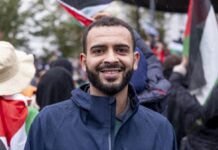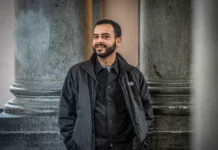Released as part of the Palestinian Prisoners week of action, Samidoun’s new video highlights the case of Khalida Jarrar, Palestinian leftist, feminist and parliamentarian imprisoned by the Israeli occupation.
Seized by occupation forces on 31 October 2019, when over 70 armed Israeli occupation soldiers invaded her home, the internationally known political leader and advocate for Palestinian rights is being charged with “holding a position in a prohibited organization,” the Popular Front for the Liberation of Palestine, before an Israeli military court. Like all major Palestinian political parties, the leftist PFLP is labeled a “prohibited organization” by the Israeli occupation.
She was arrested only eight months after her release from 20 months in Israeli administrative detention – imprisonment without charge or trial – after her last arrest by occupation forces in 2017. While imprisoned, she played a leading role in supporting the education of fellow Palestinians jailed with her, especially minor girls preparing for their high school examinations and frequently denied a teacher. She organized classes for her fellow women prisoners on the principles of international human rights law. Over 275 organizations signed onto an international call for her release.
In 2014, she resisted – and defeated – an Israeli attempt to forcibly displace her from her family home in el-Bireh to Jericho. Only nine months later, in April 2015, she was seized by Israeli occupation forces and ordered to administrative detention, imprisonment without charge or trial. After a global outcry, she was brought before Israeli military courts and faced 12 charges based on her political activity, from giving speeches to attending events in support of Palestinian prisoners. She served 15 months in Israeli prison – and was then free for only 13 months before her 2017 arrest.
Jarrar is a longtime advocate for the freedom of Palestinian prisoners and has served as the former Vice-Chair and Executive Director of Addameer Prisoner Support and Human Rights Association. A member of the Palestinian Legislative Council elected as part of the leftist Abu Ali Mustafa Bloc, associated with the Popular Front for the Liberation of Palestine, she chaired the PLC’s Prisoners Committee.
She is also a member of the Palestinian committee that acceded to the Rome Statute of the International Criminal Court and presented evidence to the international body about ongoing Israeli crimes. Her arrest – and a slew of Israeli media propaganda targeting her – escalated just as the Chief Prosecutor of the International Criminal Court, Fatou Bensouda, announced that she recommended the ICC launch a formal investigation of Israeli war crimes and crimes against humanity in Palestine.
It also came as she prepared to teach at Bir Zeit University on international law and the Palestinian movement, alongside the targeting of students for their own political and student activity on campus.
As Yafa Jarrar, Khalida’s daughter, noted, “International pressure has made the difference in how quickly mom gets released in the past.” All 5,000 Palestinian political prisoners need your support in their struggle for justice and freedom.
Khalida Jarrar recently wrote the foreword to Palestinian author Ramzy Baroud’s newest book, These Chains Will Be Broken: Palestinian Stories of Struggle and Defiance in Israeli Prisons. Samidoun urges people around the world to buy and read this important work, which is available both in print and e-book form.
An excerpt of her foreword is reprinted below from the Palestine Chronicle:
The Age of Palestinian Freedom Will Come
By Khalida Jarrar
Prison is not just a place made of high walls, barbed wire and small, suffocating cells with heavy iron doors. It is not just a place that is defined by the clanking sound of metal; indeed, the screeching or slamming of metal is the most common sound you will hear in prisons, whenever heavy doors are shut, when heavy beds or cupboards are moved, when handcuffs are locked in position or loosened. Even the bosta — the notorious vehicles that transport prisoners from one prison facility to another — are metal beasts, their interior, their exterior, even their doors and built-in shackles.
No, prison is more than all of this. It is also stories of real people, daily suffering and struggles against the prison guards and administration. Prison is a moral position that must be made daily, and can never be put behind you.
Prison is comrades — sisters and brothers who, with time, grow closer to you than your own family. It is common agony, pain, sadness and, despite everything, also joy at times.
In prison, we challenge the abusive prison guard together, with the same will and determination to break him so that he does not break us. This struggle is unending and is manifested in every possible form, from the simple act of refusing our meals, to confining ourselves to our rooms, to the most physically and physiologically strenuous of all efforts -, the open hunger strike. These are but some of the tools which Palestinian prisoners use to fight for, and earn, their very basic rights, and to preserve some of their dignity.
Prison is the art of exploring possibilities; it is a school that trains you to solve daily challenges using the simplest and most creative means, whether it be food preparation, mending old clothes or finding common ground so that we may all endure and survive together.
In prison, we must become aware of time, because if we do not, it will stand still. So, we do everything we can to fight the routine, to take every opportunity to celebrate and to commemorate every important occasion in our lives, personal or collective.
I am honored to be part of this book, sharing my own story and writing this preface.
In this book, you will delve into the lives of men and women, read intimate stories that they have chosen to share with you, stories that may surprise you, anger you and even shock you. But they are crucial stories that must be told, read and retold.
The stories in this book are not written to shock you, but rather to illustrate even a small part of the daily reality endured by thousands of men and women, who are still confined within high walls, barbed wire and metal doors. When you read this book, you will have a frame of reference that will enable you to imagine, now and always, what life in an Israeli prison is like.
And every story, whether included in this book or not, is not a fleeting experience that only concerns the person who has lived it, but an event that shakes to the very core the prisoner, her comrades, her family, and her entire community. Each story represents a creative interpretation of a life lived, despite all the hardship, by a person whose heart beats with the love of her homeland and the longing for her precious freedom.
Each individual narrative is also a defining moment, a conflict between the will of the prison guard and all that he represents, and the will of the prisoners and what they represent as a collective, capable, when united, of overcoming incredible odds.
In actuality, these are not just prison stories. For Palestinians, the prison is a microcosm of the much larger struggle of a people who refuse to be enslaved on their own land, and who are determined to regain their freedom, with the same will and vigor carried by all triumphant, once-colonized nations.
The suffering and the human rights violations experienced by Palestinian prisoners, which run contrary to international and humanitarian law, are only one side of the prison story. The other side can only be truly understood and conveyed by those who have lived these harrowing experiences.
This book will allow you to live part of that experience by briefly touching the inspiring human trajectory of Palestinian men and women who have subsisted through defining moments, with all of their painful details and challenges.
Here, you can imagine what it feels like to lose a loving mother while being confined to a small cell, how to deal with a broken leg, to be left without family visitation for years at a time, to be denied your right to education and to cope with the death of a comrade.
While you will learn of the numerous acts of physical torture, psychological torment, and prolonged isolation, you will also discover the power of the human will, when men and women decide to fight back, to reclaim their natural rights and to embrace their humanity.
indeed, these are the stories of men and women who have collectively decided never to break, no matter how great the pressure and the pain.
I would like to conclude by saluting every female and every male prisoner who is eagerly awaiting the moment of their freedom and the freedom of their people. I salute those whose stories are written in this book and I thank them for allowing us a window into an intimate, painful chapter of their lives.
As for those whose stories were not conveyed here, simply because there are thousands upon thousands of personal narratives left untold, you are always in our hearts and minds.
Dear reader, please play your part, by listening to and conveying the stories of Palestinians, whether of those who are captive in Israeli prisons or those suffocating under Israeli occupation. Carry and communicate their message to the world so that, someday, the walls of every prison may come tumbling down, ushering in the age of Palestinian freedom.
Samidoun Palestinian Prisoner Solidarity Network urges all friends of Palestine, women’s organizations and supporters of social justice to join the campaign to free Khalida Jarrar and her fellow Palestinian prisoners. Together, we can defeat Israeli attempts to silence, smear and isolate Khalida by supporting her work, publicizing her case and demanding her freedom.
For people in Canada, please urge parliament members to take action by signing this petition: https://actionnetwork.org/campaigns/free-khalida-jarrar/
You can use the following flyers and social media images to join the campaign to free Khalida Jarrar and her fellow political prisoners. Download here and share widely!
Images:
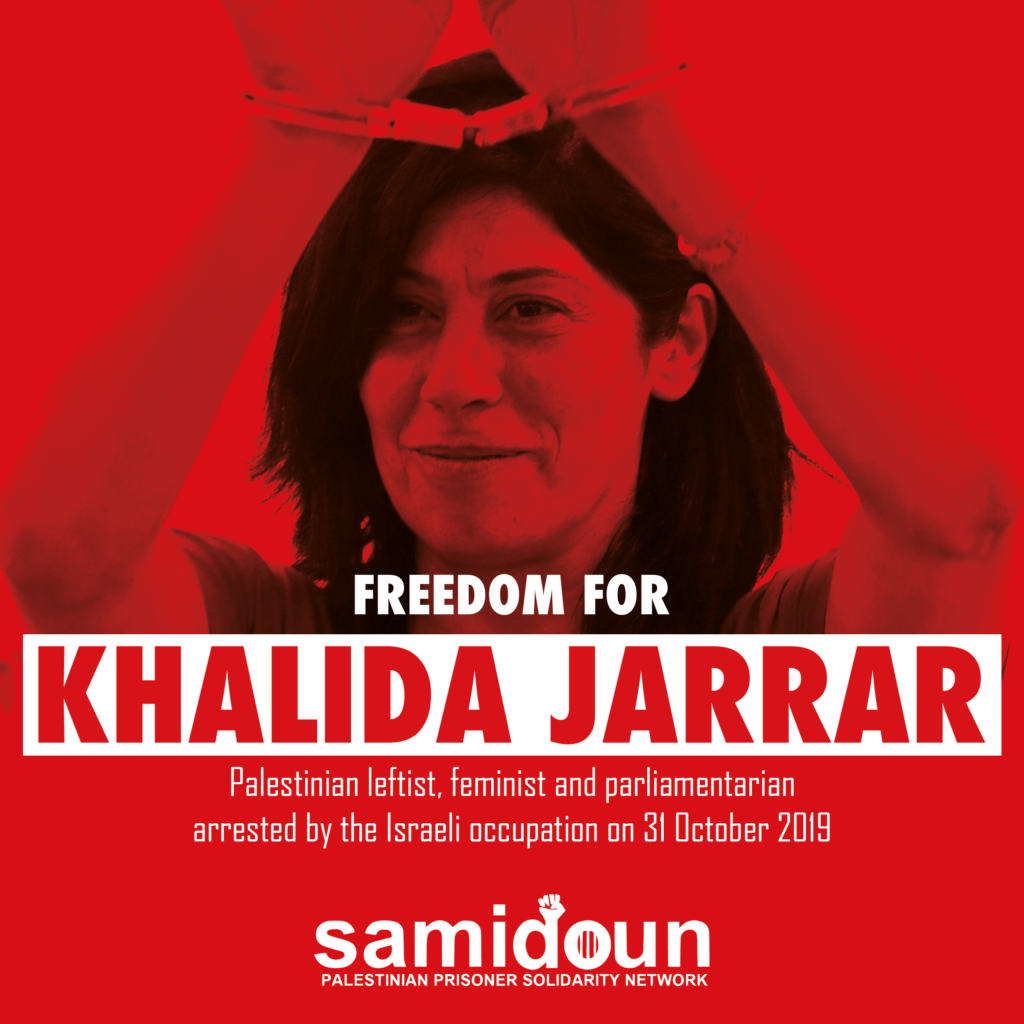
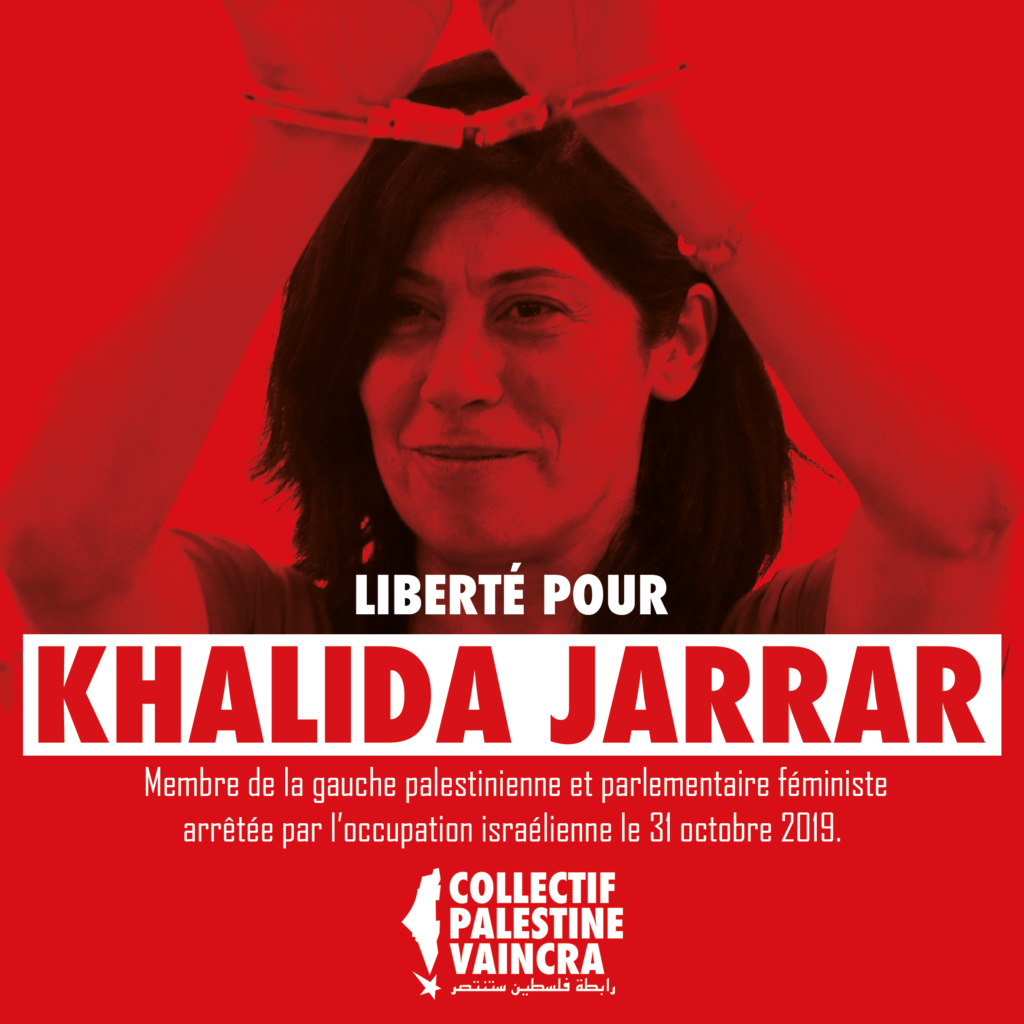
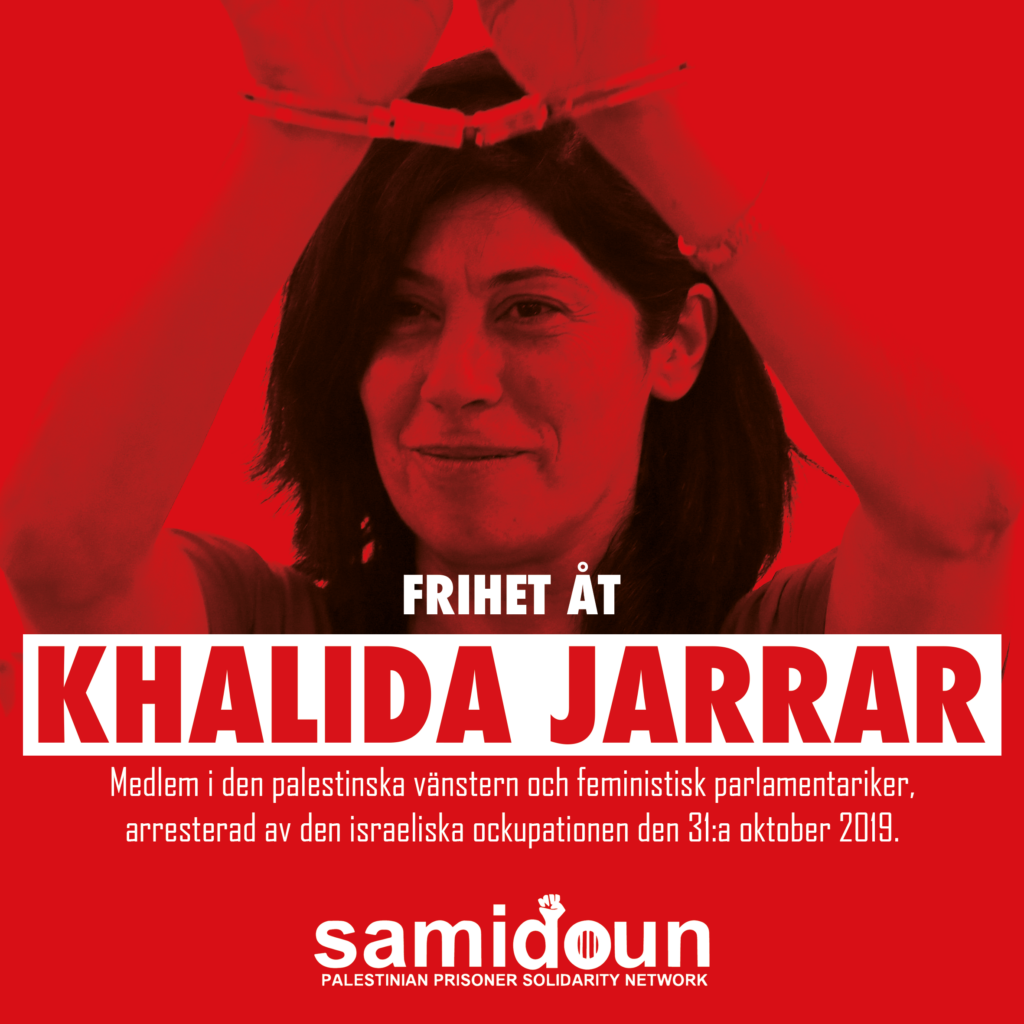
Posters:
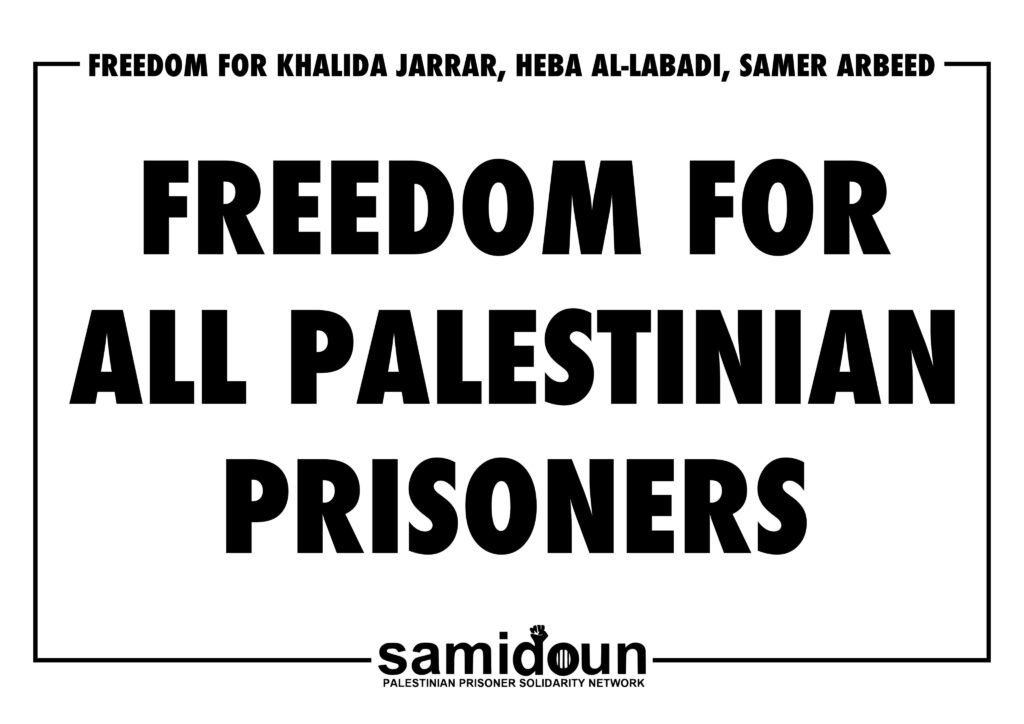
- Download Freedom for All (Download PDF)
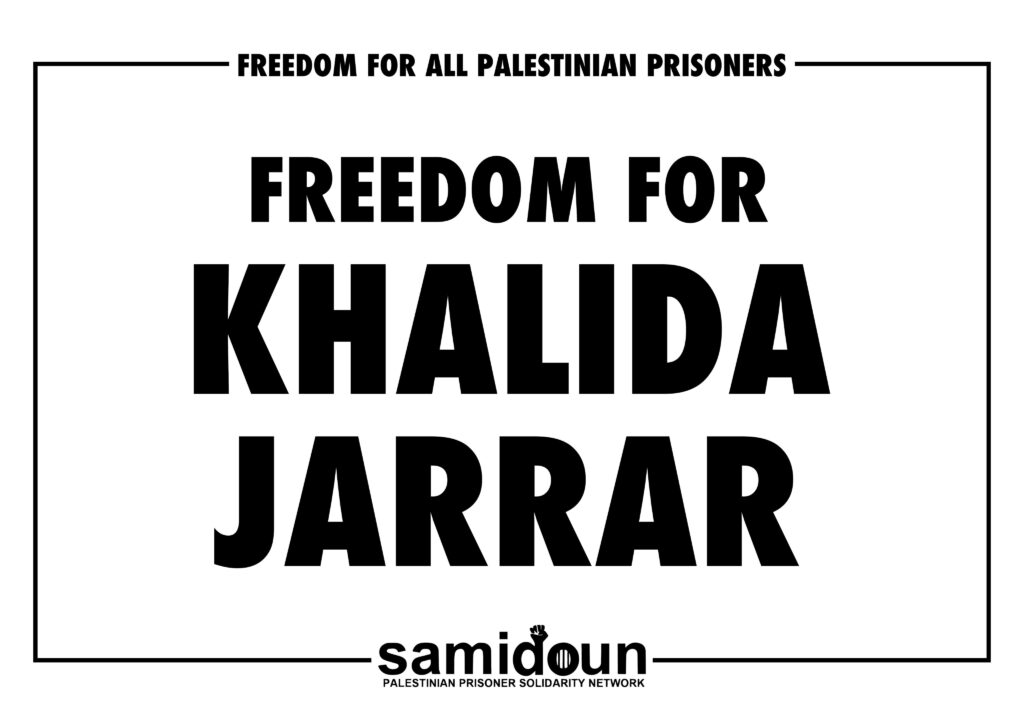
- Download Freedom for Khalida Jarrar (Download PDF)
Discover more from Samidoun: Palestinian Prisoner Solidarity Network
Subscribe to get the latest posts sent to your email.


